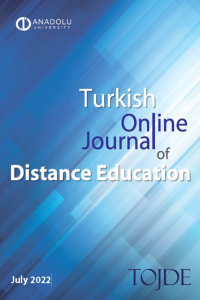Abstract
References
- Ahmed, H., Allaf, M., & Elghazaly, H. (2020). COVID-19 and medical education. The Lancet Infectious Diseases, 20(7), 777-778.
- Akmayeva, G. (2017). Impact of access control and copyright in e-learning from user’s perspective in the United Kingdom. Brunel University London.
- Alqahtani, N., Innab, A., & Bahari, G. (2021). Virtual Education During COVID-19: Exploring Factors Associated With E-Learning Satisfaction Among Saudi Nursing Students. Nurse Educator, 46(2), E18-E22.
- Arora, A. K., & Srinivasan, R. (2020). Impact of pandemic COVID-19 on the teaching–learning process: A study of higher education teachers. Prabandhan: Indian journal of management, 13(4), 43-56.
- Bao, W. (2020). COVID‐19 and online teaching in higher education: A case study of Peking University. Human Behavior and Emerging Technologies, 2(2), 113-115.
- Bora, U. J., & Ahmed, M. (2013). E-learning using cloud computing. International Journal of Science and Modern Engineering, 1(2), 9-12.
- Chen, T., Peng, L., Yin, X., Rong, J., Yang, J., & Cong, G. (2020). Analysis of user satisfaction with online education platforms in China during the COVID-19 pandemic. Paper presented at the Healthcare.
- Cheraghi, M., & Mahjub, H. (2013). urvey on Satisfaction from Quality of Passed Educational Course from Last Year Students’ Perspective of Hamadan University of Medical Sciences. Iranian Journal of Nursing Research, 8(1), 76-86.
- Demuyakor, J. (2020). Coronavirus (COVID-19) and online learning in higher institutions of education: A survey of the perceptions of Ghanaian international students in China. Online Journal of Communication and Media Technologies, 10(3), e202018.
INVESTIGATING NURSING STUDENTS’ SATISFACTION WITH THE QUALITY OF COURSES AND VIRTUAL LEARNING DURING THE COVID-19 PANDEMIC IN 2020-2021
Abstract
Education in medical sciences, including nursing, has encountered numerous challenges following the worldwide outbreak of coronavirus disease 2019 (COVID-19). Additionally, students’ satisfaction with the methods of instruction can be accompanied by improved learning outcomes. This study aimed to investigate the nursing students’ satisfaction with the quality of courses (SQC) and satisfaction with virtual learning (SVL) during the COVID-19 pandemic. This cross-sectional study was conducted at a nursing school (105 nursing students) in Tehran,Iran, in the first semester of 2020-2021. The individual characteristics questionnaire, the Course Experience Questionnaire (CEQ), and the e-Learning Satisfaction Questionnaire (e-LSQ) were used for data collection. More than 88% of the nursing students were satisfied with the quality of the courses. The level of SVL in 57.1% of them was moderate. Among the individual variables, only the academic semester was regarded as a predictor of SQC (p=0.025). There was no significant relationship between the dimensions and the total score of CEQ with students’ academic achievement (p<0.05). Additionally, all the CEQ dimensions were significant predictors of the nursing students’ SQC (p<0.001). Given the unknown time of eradicating COVID-19, it is necessary to adopt appropriate policies and perform proper planning to continue better nursing education and increase student satisfaction.
References
- Ahmed, H., Allaf, M., & Elghazaly, H. (2020). COVID-19 and medical education. The Lancet Infectious Diseases, 20(7), 777-778.
- Akmayeva, G. (2017). Impact of access control and copyright in e-learning from user’s perspective in the United Kingdom. Brunel University London.
- Alqahtani, N., Innab, A., & Bahari, G. (2021). Virtual Education During COVID-19: Exploring Factors Associated With E-Learning Satisfaction Among Saudi Nursing Students. Nurse Educator, 46(2), E18-E22.
- Arora, A. K., & Srinivasan, R. (2020). Impact of pandemic COVID-19 on the teaching–learning process: A study of higher education teachers. Prabandhan: Indian journal of management, 13(4), 43-56.
- Bao, W. (2020). COVID‐19 and online teaching in higher education: A case study of Peking University. Human Behavior and Emerging Technologies, 2(2), 113-115.
- Bora, U. J., & Ahmed, M. (2013). E-learning using cloud computing. International Journal of Science and Modern Engineering, 1(2), 9-12.
- Chen, T., Peng, L., Yin, X., Rong, J., Yang, J., & Cong, G. (2020). Analysis of user satisfaction with online education platforms in China during the COVID-19 pandemic. Paper presented at the Healthcare.
- Cheraghi, M., & Mahjub, H. (2013). urvey on Satisfaction from Quality of Passed Educational Course from Last Year Students’ Perspective of Hamadan University of Medical Sciences. Iranian Journal of Nursing Research, 8(1), 76-86.
- Demuyakor, J. (2020). Coronavirus (COVID-19) and online learning in higher institutions of education: A survey of the perceptions of Ghanaian international students in China. Online Journal of Communication and Media Technologies, 10(3), e202018.
Details
| Primary Language | English |
|---|---|
| Journal Section | Articles |
| Authors | |
| Publication Date | July 1, 2022 |
| Submission Date | November 11, 2021 |
| Published in Issue | Year 2022 Volume: 23 Issue: 3 |

